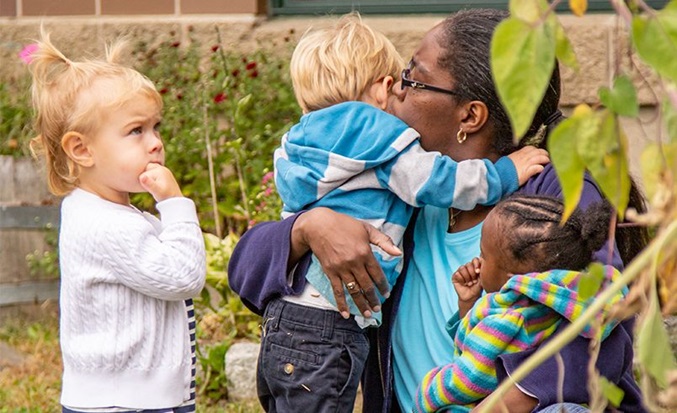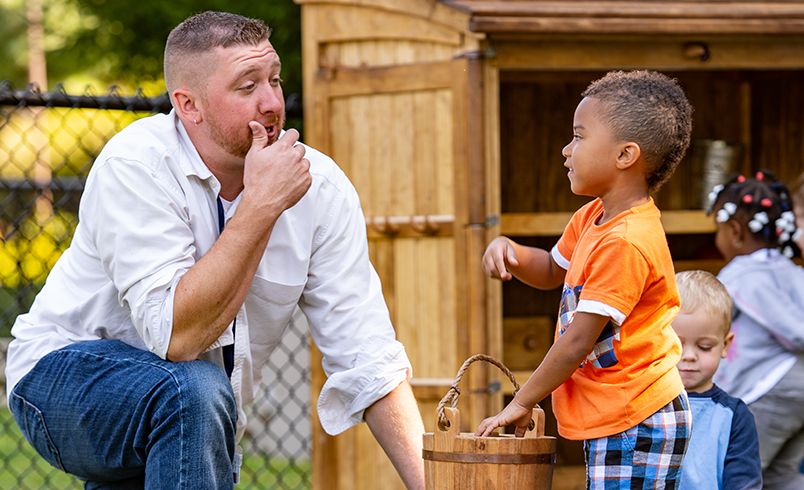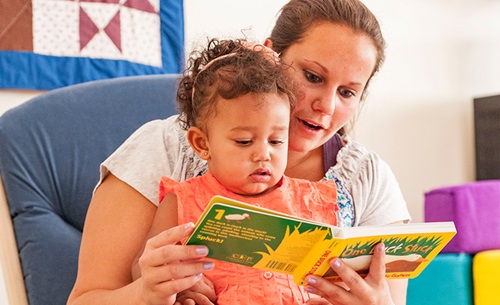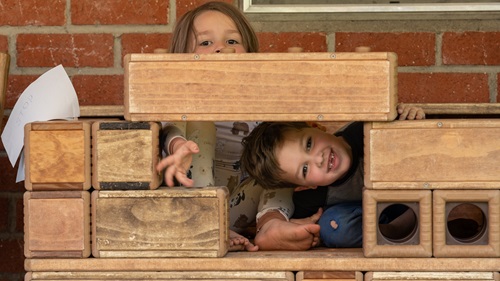Everyone Needs Attention
| June 2023Pretty much anyone who has spent time working with groups of children has heard the question, “What do I do with my child? She seems to need so much attention.” All too often the response is, “She is just doing it for attention. Ignore her.” As a former professor, early childhood teacher educator, and now as a consultant for parents and early childhood programs, I’ve heard this conversation repeatedly. What if we reframed our assumptions about children’s constant cries for attention. What if we look past the clamorings for attention and thought, this child is looking for relationship?
What Children Need
From my knowledge of child development, I understand that young children need our attention. Brain development research shows us that to feel attached and worthwhile children need our love, touch, and full-on attention to survive and thrive. We also know that young children who need attention don’t necessarily act in ways that adults expect from older children and adults. When children do not receive our attention, they compensate in all kinds of ways: by repressing their needs, shouting and becoming aggressive or violent, harboring resentment, or seeking attention from anyone who will give it to them.
How does a young child express his fear of abandonment or need for adult interaction, if not by seeking our attention? When a child is unable to adapt to the social norms of classroom behavior or is constantly demanding our attention, it is important to examine why.
I knew a five-year-old whose childhood in foster care system left him with no steady adult influence. His deep craving for stability and relationship contributed to difficult classroom behavior, frustrating his teachers. His eventual expulsion from school and transition to another foster home perpetuated a sad cycle of abandonment and self-blame. Will a compassionate adult enter his life one day to grant him the attention he craves and break this endless cycle of rejection and misunderstanding?
Are they Just Seeking Attention?
Once when I was presenting at a conference about discipline, people in the room shared stories about children’s negative behaviors, which they labelled “attention-seeking.” It made me wonder why the idea of children wanting attention is such a negative idea: Did we learn as children that it was bad, or even shameful, to want attention in the first place? With this revelation, I blurted out, during the discussion at my session: “What if instead thinking that she is just doing it for attention, we thought: “She is just doing it for relationship.” When we replace the idea of children seeking attention with children wanting a relationship, we begin to talk differently about how, we as educators, might react. For example, if a fellow adult cries out for help, we do not ignore them, we become more present and listen or observe with patience. The whole conversation changes.
I think the current discussion about the concept of self-regulation is one source of our aversion to children needing our attention. We understand that to succeed academically and emotionally, young children need to learn how to adapt to societal norms. However, it seems that adults have become punitive in their desire for children to learn self-regulation. Are we reacting in anger when children express their need for attention. Children learn to please adults and stifle their emotions as they try to understand how to self-regulate. Learning to regulate emotions takes time. We could help children learn when and how to express emotions with guidance, understanding, and through relationship, rather than painful punishments or banishments to self-isolation or time out.
Help them Thrive
Adults too often behave as if we do not want children to disrupt our routine. This sends the message that we have more important issues to deal with. Children need us to see them as whole human beings, not just the sum of their behaviors. They need us to listen to them, to validate their feelings, and to take them seriously for who they are today and who they will grow up to be. Children need our attention―our connection, and relationship―and seeking it shouldn't be inherently negative.
At the conclusion of my presentations, I often read aloud a paragraph from the last chapter of my book: Everyone Needs Attention: Helping Young Children Thrive. Allow me to share it with you, here:
When stormy emotional rivers have thrashed around me, I have hung on for dear life to compassion and gratitude. They have always steered me to the other side – to calmer waters of acceptance and love. As teachers, children give us work, passion, and inspiration. They will love us with all their might if we pay attention to them with an open heart. If we watch them closely, we can learn about emotions, spontaneity, joy for life, curiosity, and ourselves, for we relive our own childhoods over and over again, each time redeeming our own selves through their first-time discoveries and expressions of amazement.
Be grateful for them.
Forgive them.
Love them with all your might. (Jacobson 2018)
Reference:
Jacobson, Tamar, PhD.2018. Everyone Needs Attention: Helping Young Children Thrive. St. Paul, MN, RedLeaf Press.









